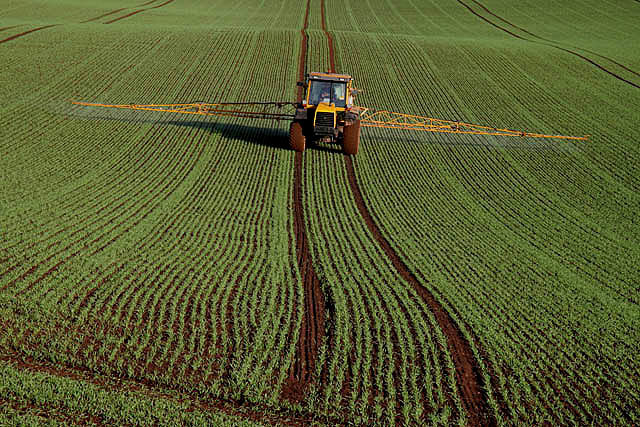BACKGROUND ARTICLE
shifting roles
The contractor as technology consultant
Contractors play a vital role in modern day farming. We’ve asked Eric Drésin, director of CEETTAR (Confédération Européenne des Entrepreneurs de Travaux Techniques Agricoles, Ruraux et Forestiers) and Maurice Steinbusch, secretary of agricultural contracting at Cumela (the Dutch branch organisation for contractors), to share their view on the role of contractors in the digitization of the agricultural sector.
Digitization is an undeniable trend in the agricultural sector. Even though the advancement is slower than desired, according to this recent Dutch report, both Eric and Maurice agree that digitization will increase in the coming years. ‘Technology as such is not a driver,’ says Eric, ‘but there’s a clear need to reduce production costs and to increase sustainability.’ Maurice thinks the trend is inevitable. ‘Whether we welcome digitisation and robotization or not, fact is that these developments will continue. We cannot completely fathom the extent of their influence, but they will change agriculture for sure.’

Investment
The constant stream of technological developments makes the investment in new machines quite costly for farmers, especially for smaller and medium sized farms. ‘In husbandry, for example, many farmers rather focus on the cattle and leave the machinery to the contractor. They also lack the resources to buy a new machine every five years or so,’ Maurice says. ‘So the contractor takes the risk to make the investment.’ ‘Not only the machines are expensive, keeping up with new technology demands constant education. Knowledge is an investment, too,’ Eric observes.
The contractor as consultant
Since contractors are often the first to invest in new technologies, both see them as gate-keepers when it comes to the implementation at farm-level. As a result, the role of the contractor shifts from mainly machine operation towards full-service agricultural consultancy. ‘It’s not only about having the newest or best machines. It’s crucial to work efficiently and offer a complete package that is valuable to the farmer. A contractor who maps a farmer’s field should also be able to interpret the data correctly and advise the farmer on which crops to cultivate,’ Eric says. Maurice adds that these developments require different skills from contractors. ‘ICT becomes more important in the contracting business. Data management, too. We see that contracting organisations start to hire people for this.’
"The choice for a type of machine, leads to a choice for a certain data management system. And societal demands have changed."
Barriers
‘Forestry shows the way in agriculture, in a sense,’ says Eric. The newest machines have strikingly futuristic features: they send data on wood quality of harvested trees directly from the Finnish forest to an office down in Helsinki, for example. Yet, both point to hurdles that hamper the uptake of IoT technology in agriculture. ‘First and foremost: complexity,’ answers Maurice. ‘The pace of evolution is superfast, so it’s both difficult to keep up and difficult to decide when to invest. Then, high costs and interoperability issues between different brands. And last but not least, data ownership poses uncertainties.’ He also observes that ‘most farmers are reluctant to be the first to try something new. Still, we see that GPS-based steering systems become standard now. Surely because such systems increase efficiency, but even more because they are very convenient. Convenience is an important factor driving implementation.’
Practice varies across countries
As the director of a European association, Eric sees that the pace in which new technology is tried and implemented in the agricultural sector varies across Europe. ‘Generally speaking, farmers and contractors in Northern Europe are more keen to try and use new technology. Internet of Things technology is not a top priority in Southern Europe. Yet, I’m sure that there are people in Spain, Portugal or Greece who are experimenting with the newest IoT technology and who are running their farms in the most modern way possible.’ Apart from a different mindset, other factors such as the size of farms, the average age of farmers, landownership and access to finance have a decisive influence on the speed of digitization. Farms in Eastern Europe are quite large, for example, making contractors less important.
The contribution of policy makers
‘Of course the type of advisory services we’re talking about existed in the past already. What’s different is the extent to which everything is integrated: the choice for a type of machine leads to a choice for a certain data management system. And societal demands have changed. Society demands more sustainability, the government demands certification. Contractors need to take these demands into account as well,’ Eric says. When asked if policy-makers can help, Eric confirms. ‘Clarifying the uncertainties on data ownership is one of the main issues where policy-makers can help the agricultural sector and quicken the digitization process.’ Maurice adds to this: ‘Government should help to demonstrate the benefits, because precision farming has the potential to help us create a more sustainable food production process. Reducing emissions, reducing pollution and waste and increasing efficiency is better for our society as a whole.’
